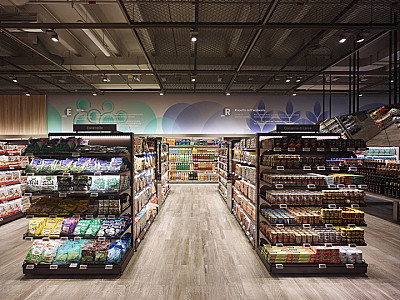Indonesia Wants its Groceries Faster Than Ever
The technological advancement and current pandemic situation had left a huge impact towards the advancement of the e-grocery industry. Here's what you should know.



Artificial Intelligence (AI) has become integral to various industries in Indonesia. From generative AI and chatbots to route optimization and face recognition, the new technology has reshaped the manner we live and work.
Before we explore the dynamic evolution of artificial intelligence in Indonesia, let's first establish a foundational understanding of AI and examine its widespread adoption among the public.
Artificial intelligence refers to computer systems with the ability to perform tasks that typically require human intelligence.
These tasks include learning, reasoning, problem-solving, perception, and language understanding. The technology mimics human cognitive functions, enabling them to analyze data and recognize patterns, thus helping humans make decisions.
Generative AI stands out as one of the most popular artificial intelligence technologies in use today. This cutting-edge AI technology can produce diverse forms of content, spanning text, images, audio, and even videos.
A recent survey from Populix especially highlights this widespread generative AI adoption by workers and entrepreneurs in Indonesia.
About 45% of their survey respondents claim to have integrated AI applications into their daily work. ChatGPT, a free-to-use AI system from OpenAI, leads the pack with 52% vote as the most favored AI application in Indonesia.
The ranking is followed by Copy.ai with a usage rate of 29%, Luminar AI (18%), and Oracle (15%).
The survey also reveals that a substantial number of respondents (40%) engage with AI applications more than once a month. Meanwhile, the age distribution indicates a dominant presence of Gen Z users (51%), closely followed by millennials (33%).
Indonesia may not be at the forefront of AI research and development in Southeast Asia, but there are already noteworthy initiatives and implementations of AI to streamline operations and improve efficiency in various sectors.
Take, for instance, the Aku Pintar Indonesia app, which has incorporated AI into its local digital education platforms. They aim to help students discover their interests and talents with personalized subject recommendations and an AI education counselor, Asterbot, who assists the students throughout their learning journey.
As noted by East Ventures, Ruangguru has also been leveraging AI through its service, Roboguru, since 2021. This AI-based tool allows users to get answers and step-by-step solutions to the problems they upload on the forum.
On a different front, Waresix, Indonesia's leading logistics integrator, has pioneered the Waresix Operating System (wOS), an AI-driven operating system.
The smart routing feature within wOS employs AI to determine the most efficient delivery route after considering various on-ground factors. This system not only trims travel time but also systematically reduces carbon emissions, improves fuel efficiency, and extends the overall lifespan of operating trucks.
The implementation of AI in Indonesia does not stop there. Companies across various sectors, including e-commerce, banking, and telecommunications, have integrated chatbots to provide real-time support, answer queries, and improve overall customer experience.
According to an Ipsos survey, a whopping 78% of respondents in Indonesia firmly believe that the benefits of AI outweigh any potential harm the technology can cause. This number pushes Indonesia as the most optimistic nation in regards to AI technology development.
Meanwhile, Thailand secures the second spot in the optimism race, with 74% of respondents, closely followed by Mexico, Malaysia, Peru, Turkey, Colombia, India, and Brazil.
Indonesia's upbeat outlook on AI is not just a sentiment; it's proven by the making of the National Artificial Intelligence Strategy (Stranas KA) 2020-2045. This strategic framework lays the groundwork for AI development in Indonesia, fostering collaboration between government, industry leaders, academia, and society.
Within the framework, Indonesia focuses on five priority areas for AI development: health services, bureaucratic reform, education and research, food security, and mobility and smart cities.
The Artificial Intelligence Industrial Research and Innovation Collaboration (KORIKA) organization steps up as a facilitator for this coordination. The vision is for KORIKA to cultivate a collaborative ecosystem that accelerates AI implementation throughout Indonesia.
Simultaneously, the Ministry of Communication and Information also contributes to this momentum by issuing AI Certificates and Indonesian National Work Competency Standards (SKKNI) for AI. These certifications call for a clear business vision of each applicant's proposed AI technology.
The Ministry is also in preparation to present a more inclusive national AI governance through AI Circular Letter. This circular letter is a soft regulation and will be a normative reference for businesses in developing and designing AI in Indonesia.
From easing daily tasks to fulfilling national strategic goals, it's evident that Indonesia plans not only to adopt but also to embrace the transformative power of artificial intelligence.
While the journey has only begun, the future holds exciting possibilities for Indonesia's AI-driven evolution. Need more insights about AI technology and its development? Check out our services or contact us to be connected with our expert network now!
We will give you updates of our latest news
The technological advancement and current pandemic situation had left a huge impact towards the advancement of the e-grocery industry. Here's what you should know.

GoTo is set to IPO in the Indonesian market. Here are some facts you need to know.

The Dark Store appearance is seen as the e-grocery supply evolution, here’s what you need to know.

Although the 5G network has been around for a while, the world appears to be pessimistic about how much profit it can gather. Does Indonesia have a similar opinion?
